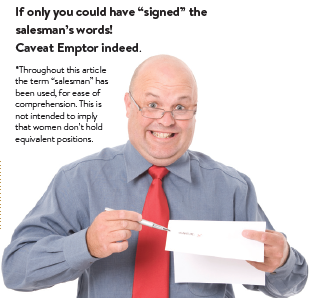
We have been receiving a lot of enquiries from NACO members who feel they have been mis-sold the pitch licence agreement – if not their caravan or lodge – by a salesman* who is now unavailable for comment. This is usually because he has jumped onto the park operator’ “salesman roundabout” that sees him arrive at a far-flung park to resume his unit-shifting activities.
The core matter of the cases is covered elsewhere in this edition of ParkLife, but it started me thinking about a human characteristic that should be borne in mind when one is asked to sign a legally binding document – particularly if thousands of pounds are at stake.

So, what is this “human characteristic” that I’m referring to? It is the propensity to accept that the words spoken by a person presumed to be in a qualified position (e.g., a caravan salesman) supersede the written content of the document one is being asked to sign. Even if those spoken words blatantly contradict the written version.
The classic example, in NACO’s experience, is the pitch licence agreement issued by a holiday-licensed park operator. In this example, the salesman is aware that the potential caravan owner has sold their bricks-and-mortar home and is intending to use the caravan as their main residence. The written wording of the agreement warns against doing this.
Understandably, the customer may take this moment to query the discrepancy with the salesman. Following our recent request for information from members about the nature of the sales process, a generic representation of the salesman’s response could be rendered as, “Oh, you don’t need to worry about that, we just need you to give us your son’s address.” And the document is signed. But why? Why do we let ourselves be persuaded by words that contradict those we are about to sign up to?
It seems we make a mental adjustment and assume that the salesman’s term (which obviously won’t form part of the contract) in some way amend the document, so we can sign in good faith.
We seem to be attributing a degree of care and concern to the salesman that clearly doesn’t exist. We don’t like confrontation and we don’t like insubordination (he’s in the qualified position, after all) so we go along with him.
One of the most persuasive ways of nudging a person’s behaviour in a desired direction is to tell them that the majority of people similar to them, faced with the same situation behave in a certain way (in this case, signing the agreement.)
Flash forward two years, five years, whatever. The local authority is asking to see your Council Tax bill. This is a holidaylicensed park after all. Your son’s won’t suffice. Approaching the park won’t help, the salesman has moved on, and – oh dear – you’re in breach of your pitch licence agreement. What were you thinking when you signed it?!


RELATED ARTICLES - advice and support
Published on 08 June 2023 By Jenny Blumsom